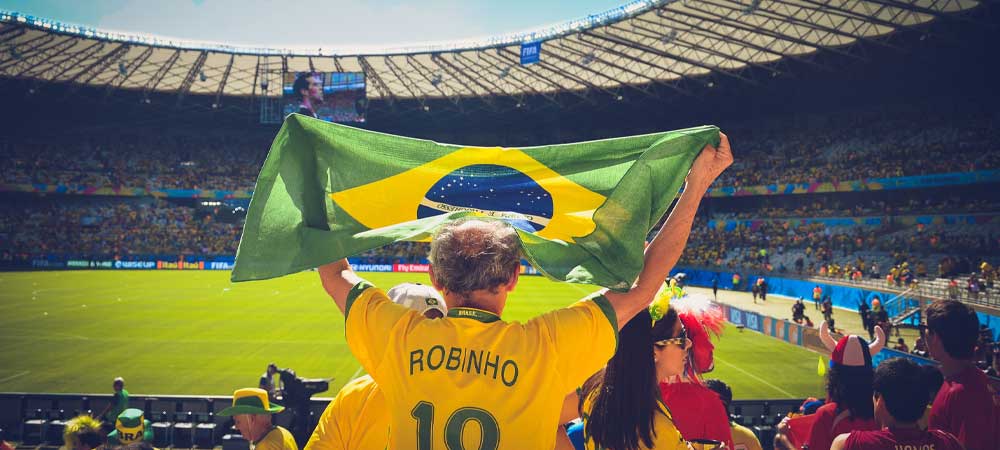- Brazilian President Jair Bolsonaro is set to grant final approval on a plan to transfer control of the sports betting industry from the public sector to private operators.
- This plan is likely a result of Brazil’s need to cut government spending in the wake of the economic recession caused by COVID-19.
- Under private management, the odds that Brazil’s sports betting industry grows into one of the biggest in the world is favorable.
BRASILIA, Brazil – As a part of its Investment Partnership Program (PPI) to stimulate the national economy in the wake of the coronavirus pandemic, Brazil is looking to privatize sports betting.
The aims of the PPI are to create jobs, mitigate the economic consequences of COVID-19, and improve the overall efficiency of the public sector.
The inclusion of gambling in the PPI was approved by Brazilian Minister of Economy Paulo Guedes last week.
Next, it will need final approval from Brazilian President Jair Bolsonaro.
If approved, Brazilian gambling would be enrolled in the National Privatization Program (PND), which has long been the choice tool for Brazil to transition certain industries from public to private control.
The plan likely won’t be fully realized for at least another year as Brazil has been racked by the COVID-19 pandemic. Their 1.1 million confirmed infections are second only to the United States’ nearly 2.4 million and Brazil has accounted for 11% of all COVID-19 deaths.
The aim of the privatization project is ostensibly to transfer the risk of legal sports betting from the public sector to the private while still retaining some of the economic benefits (e.g., taxation).
Why Is Brazil Privatizing Such A Lucrative Industry?
Put simply, sports betting is a high-cost industry that requires constant investment in technology and a willingness to embrace innovation.
The Brazilian government was stretched financially thin by the global collapse of oil prices and the decrease in exports to China, but the shutdowns and quarantines forced by the novel coronavirus have necessitated drastic cutbacks.
Sports betting could eventually morph into a highly profitable industry for the government, but the money and resources needed to fuel that development are badly needed to fund health and welfare projects right now.
The government will still collect a hefty sum in sports betting taxes and won’t have to pay high operational costs, although it will also be severely limiting the potential benefits of a healthy sports betting industry.
The State Of Brazilian Sports Betting
For such a populous and sports-mad country, Brazil’s sports betting industry remains relatively small and inefficient.
There are retail and online sportsbooks available throughout the country, but the vast majority of bets are still placed with unregulated local bookies.
Right now, the sports betting industry is essentially dormant, as all retail sportsbooks have been ordered closed to prevent further spread of COVID-19 and the country’s most popular sports leagues, including Brazilian Série A soccer, are on hiatus as they explore ways to safely resume play.
Prior to the virus, industry growth was steady but slow.
Under newer, more efficient management, it’s conceivable that Brazil could quickly develop into one of the pre-eminent global sports betting markets.
Advertising Disclosure
In order to provide you with the best independent sports betting news and content LegalSportsBetting.com may receive a commission from partners when you make a purchase through a link on our site.
News tags: Brazil | China | Coronavirus | COVID-19 | Investment Partnership Program | Jair Bolsonaro | Minister of Economy | National Privatization Program | Paulo Guedes | Serie A

With a dual background in English and sports performance and business analytics, Carter aims to write stories that both engage and inform the reader. He prides himself on his ability to interweave empirical data and traditional narrative storytelling. When he isn’t keeping readers up to date on the latest sports betting legal news, he’s banging his head against a wall regretting his decision to be a Tampa Bay Buccaneers fan.


 College Football Betting
College Football Betting Best Online Sports Betting
Best Online Sports Betting Best Legal NFL Betting
Best Legal NFL Betting States With Legal Sports Betting
States With Legal Sports Betting Sports Betting Events
Sports Betting Events




